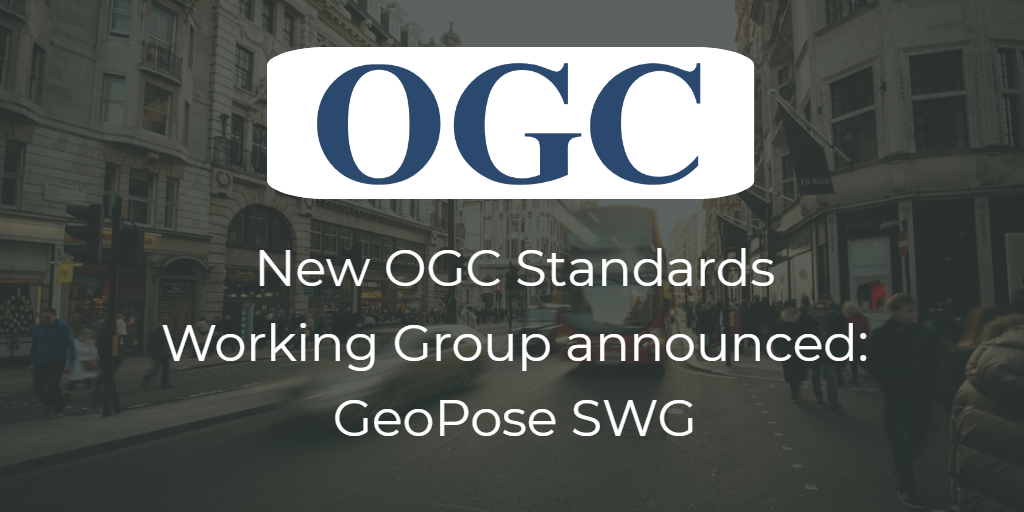Members of the new GeoPose SWG will work towards a standard to provide an interoperable way to express, record, and share the location, position, and orientation of objects across diverse applications, users, devices, services, and platforms.

The Open Geospatial Consortium (OGC) announces the formation of the GeoPose Standards Working Group (SWG). Participants in this new OGC SWG will focus on developing a standard for geographically-anchored poses (aka GeoPoses) with six degrees of freedom referenced to one or more standardized Coordinate Reference Systems.
The combination of position (x, y, z or longitude, latitude, elevation) and orientation (pitch, roll, and yaw) with 6 degrees of freedom for objects in computer graphics and robotics is usually referred to as the object's “pose.” Pose can be expressed as being in relation to other objects and/or to the user. When a pose is defined relative to a geographical frame of reference or coordinate system, it will be called a geographically anchored pose, or ‘GeoPose' for short.
An object with a GeoPose may be any real physical object. This includes objects such as AR display devices (proxy for a user's eyes), vehicles, robots, or even a park bench. It may also be a digital object like a BIM model, a computer game asset, the origin and orientation of the local coordinate system of an AR device, or a point-cloud dataset.
All physical world objects inherently have a geographically-anchored pose. Unfortunately, there is not a standard for universally expressing the pose in a manner that can be interpreted and used across the range of modern computing platforms.
The ability to specify the GeoPose of any object will aid in interoperability between real world 3D spatial computing systems, such as those under development for autonomous vehicles, augmented reality (AR), 3D map visualization, or any digital representation of the physical world or part therein (e.g., digital twins).
Members of the GeoPose SWG will work towards defining an interoperable way to express, record, transform, and share the GeoPose of objects in a consistent manner across different applications, users, devices, services, and platforms.
Standardized GeoPoses could simplify traffic awareness and management: describing the pose of moving cars and people in a universally consistent manner could lower the incidence of accidents and road deaths. The same real-time GeoPose of a vehicle or pedestrian could be shared and displayed in different systems including:
- a traffic visualization on a screen in another car,
- shown directly at its physical location in the AR glasses of a pedestrian that is around the corner for the car, or
- in the real-time world model used by an autonomous vehicle or delivery robot to help it navigate the world and avoid other vehicles or pedestrians.
OGC members who can share their expertise regarding GeoPoses are invited to participate in the GeoPose Standards Working Group. Visit the OGC GeoPose SWG home page or contact info@ogc.org for more information on the group, including how to participate.
Visit OGC's Domain Working Group and Standards Working Group pages to learn about other standards activities happening in OGC. There is currently a strong emphasis on topics related to Internet of Things, Smart Cities, Aviation & Unmanned Systems (eg UAVs), Big Data, Linked Data, Disaster Response, Maritime, Indoor Location, Blockchain & Distributed Ledgers, and more.
About OGC
The Open Geospatial Consortium (OGC) is an international consortium of more than 530 businesses, government agencies, research organizations, and universities driven to make geospatial (location) information and services FAIR – Findable, Accessible, Interoperable, and Reusable.
OGC's member-driven consensus process creates royalty free, publicly available geospatial standards. Existing at the cutting edge, OGC actively analyzes and anticipates emerging tech trends, and runs an agile, collaborative Research and Development (R&D) lab that builds and tests innovative prototype solutions to members' use cases.
OGC members together form a global forum of experts and communities that use location to connect people with technology and improve decision-making at all levels. OGC is committed to creating a sustainable future for us, our children, and future generations.
Visit ogc.org for more info on our work.
“







